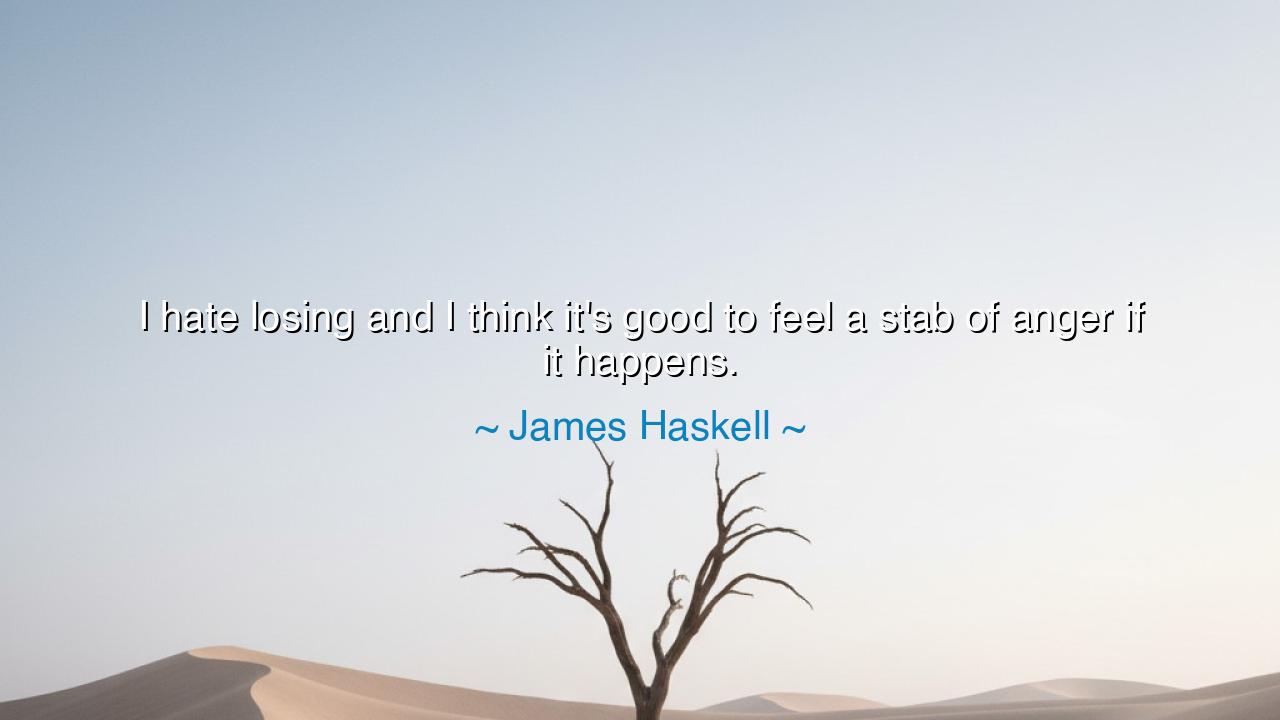
I hate losing and I think it's good to feel a stab of anger if it






Host: The gym was nearly empty, lit by the cold white glow of fluorescent lights that made every drop of sweat glisten like confession.
The air hung thick with the smell of iron, chalk, and determination — that sacred perfume of those who refuse to quit.
The rhythmic clang of weights echoed faintly from the far side, then silence — the kind that always comes after defeat.
Jack sat on the bench, hands gripping a towel, sweat dripping down his temples, his chest rising and falling with exhaustion and disbelief. Jeeny leaned against the wall across from him, arms crossed, her eyes steady but sympathetic, like someone watching a storm that doesn’t know how to stop itself.
Jeeny: quietly, reading from her phone “James Haskell once said — ‘I hate losing and I think it’s good to feel a stab of anger if it happens.’”
Jack: snorting, wiping his face “Good. Then I’m practically enlightened.”
Jeeny: smiling faintly “You lost?”
Jack: dry laugh “Lost? No. I got dismantled. Outplayed. Out-thought. Outworked. You name it.”
Jeeny: “And that’s supposed to make you feel what — calm?”
Jack: throwing the towel aside “No. Angry. Furious. But Haskell’s right — maybe that’s not a bad thing.”
Host: The sound of rain began to drum faintly against the windows, slow and steady — a mirror for the tension simmering in the air. The whole gym smelled of metal and rain, grit and reflection.
Jeeny: walking closer “You know, anger gets a bad reputation. But it’s one of the most honest emotions we have. It means you cared enough to hurt.”
Jack: nodding slowly “Yeah. People say losing builds character. But that’s crap. Losing tests it. Builds nothing — unless you fight to rebuild.”
Jeeny: “And the anger’s the spark for that rebuilding.”
Jack: looking up at her “Exactly. It’s the blood in the bruise. The proof you’re still alive enough to care.”
Host: The lights buzzed above them, flickering slightly. Somewhere a locker door slammed — a distant punctuation to the raw honesty of the moment.
Jeeny: “So what do you do with the anger?”
Jack: smirking bitterly “Depends on the day. Sometimes I channel it. Sometimes I drown it. Sometimes it just sits there like a stone in my chest.”
Jeeny: softly “But you never ignore it.”
Jack: “Ignoring it’s like ignoring fire. Pretend it’s not there and it burns you anyway.”
Host: The rain grew louder, rattling the glass now. Jeeny stepped closer, sitting on the edge of the bench beside him, her tone gentler.
Jeeny: “Haskell wasn’t just talking about rugby. He was talking about pride — the kind that’s tied to purpose. Losing stings more when what you’re fighting for actually matters.”
Jack: nodding “Yeah. When you’ve poured yourself into something — the anger’s not just frustration. It’s grief. You’re mourning the version of yourself that believed you’d win.”
Jeeny: quietly “But mourning can be fuel too.”
Jack: “If you don’t let it rot.”
Host: The gym clock ticked, loud and mechanical, marking the slow passage of reflection. Jack leaned forward again, elbows on his knees, his voice low but steady.
Jack: “You know what I realized? People who claim they don’t care about losing are either lying or dead inside. You can’t compete without passion. And passion always risks pain.”
Jeeny: “That’s the cost of caring.”
Jack: half-smiling “Exactly. You can’t build greatness on indifference. You need the sting — that stab Haskell talks about. The trick is not letting it stab you twice.”
Jeeny: “Once when you lose, and again when you stop trying.”
Jack: looking at her “Yeah. That second one’s worse.”
Host: The lights flickered again, the rain outside now a full downpour, drumming against the roof like a challenge. Jeeny watched him — that quiet strength in her gaze, the kind that steadies a fighter after the bell’s already rung.
Jeeny: “So what’s next?”
Jack: standing, grabbing his bag “Tomorrow. Always tomorrow. You feel the anger, then you turn it into something useful. Anger’s just energy looking for direction.”
Jeeny: smiling faintly “And you know where yours is going?”
Jack: grinning now, though tired “Back to work. Losing’s temporary. Regret’s not.”
Host: The camera followed him as he walked toward the exit, rain streaking down the windows beside him — reflections of a man who refused to let defeat become identity. Jeeny watched him go, her voice low, steady, like a closing thought.
Jeeny: “You know, Jack, maybe Haskell was right — anger isn’t weakness. It’s the reminder that your spirit’s still awake. It’s pain refusing to turn into apathy.”
Host: Jack stopped at the door, turned back with a faint, knowing smile — the look of someone who’s been broken but not beaten.
Jack: quietly “Yeah. Anger’s proof the fire’s still there. You just have to learn how to aim it.”
Host: The door opened, and the sound of rain flooded the room — fierce, cleansing, relentless.
Because James Haskell was right —
anger isn’t the enemy of growth; it’s the spark that ignites it.
To hate losing is to love excellence.
To feel the stab of failure is to still believe you can win.
The weak suppress anger and call it peace.
The strong confront it and call it purpose.
And as Jack stepped into the storm,
the rain washed the sweat from his skin,
his jaw set, his heart steady,
the night around him alive with the sound of falling water and quiet resolve.
Because defeat isn’t the end —
it’s the wound that reminds you
to fight again.






AAdministratorAdministrator
Welcome, honored guests. Please leave a comment, we will respond soon